2017-2018 Past Events
2018
PhD Career Day
Date: November 30, 2018
The Georgetown University, Modern Language Association (MLA) and Connected Academics’ ReinveintPhD project hosted this free career exploration full-day for regional and local current and recent humanities PhD and MA students, where they learned how to pursue diverse career objectives from the experts. The activities were led by John Paulas, PhD, President of PhD Matters, Ltd.
The event had two sessions:
- Humanities PhDs Working in the World Seminar: This lively interactive seminar introduced graduate students to ways of thinking about their future lives and careers as humanities professionals. The seminar offered examples of the wide variety of careers that humanities PhDs pursue, along with practical advice, exercises and encouragement. The attendants had the opportunity to ask questions about writing résumés, using online job search resources, and translating their skills for public-facing employment.
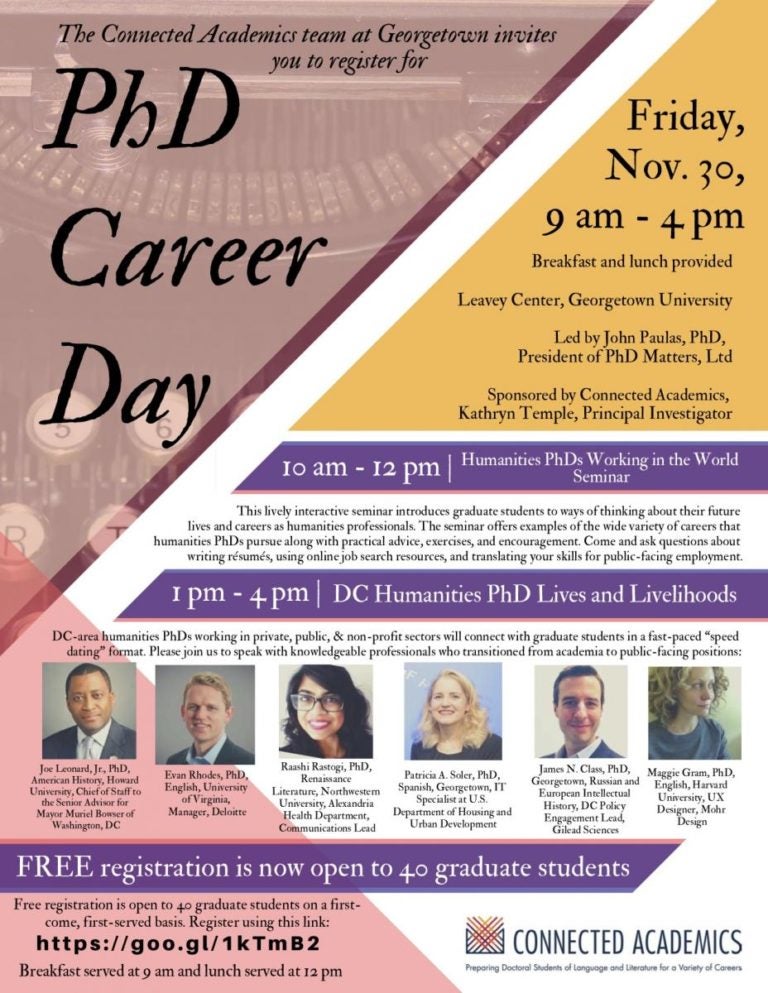
- DC Humanities PhD Lives and Livelihoods: Dc-area humanities PhDs working in private, public and non-profit sectors connected with graduate students in a fast-paced “speed dating” format. Attendants had the opportunity to speak with knowledgeable professionals who transitioned from academia to public-facing positions.
The humanities professionals who attended the event included: Joe Leonard, Jr., PhD in American History from Howard University, Chief of Staff to the Senior Advisor for Mayor Muriel Bowser of Washington, DC; Evan Rhodes, PhD in English from University of Virginia, Manager at Deloitte; Raashi Rastogi, PhD in Renaissance Literature from Northwestern University, Communications Lead at Alexandria Health Department; Patricia A. Soler, PhD in Spanish at Georgetown University, IT Specialist at the US Department of Housing and Human Development; James N. Class, PhD in Russian and European Intellectual History from Georgetown University, DC Policy Engagement Lead at Gilead Sciences (Biotech); and Maggie Gram, PhD in English from Harvard University, UX Designer at Mohr Design.
First Book Hill Humanities Colloquium
Dates: September 6, September 20, October 4, October 25, November 1 and November 15, 2022
From the growing diversity of tenured faculty and their research interests to technological tools transforming the way we research and write, who could question that the humanities are in a state of incredible flux? Amidst this change, long-term patterns in humanities enrollments have spurred some to declare a state of crisis. Such claims warrant critical scrutiny from viewpoints both within and beyond the academy. Here in Washington, we have a wonderful cross-section of scholars and practitioners with just such an array of perspectives to inform lively debates on these issues.
Kathryn Temple (Georgetown Department of English) and Mathew Burrows (Foresight, Strategy and Risks Initiative, The Atlantic Council) and Aiyaz Husain (PhD History, Fletcher School of Law and Diplomacy) co-organized this colloquium, which gathered with humanities professionals and graduate students to discuss the state of the humanities in America. The topics covered spanned from graduate education in the humanities, the fluidity of disciplinary boundaries, the applicability of the humanities to today’s knowledge economy, and the current-day role of the university in society. The colloquium was free and open to the public, and took place in the wine bar at Bistrot Lepic, 1736 Wisconsin Ave NW in Georgetown.
This was the schedule of sessions and topics:
- September 6, “Humanities Curricula Today”.
- September 20, “Diversity in the Humanities”.
- October 4, “Should we Re-conceive Humanities Disciplines?”
- October 25, “Building Bridges Across Fields”, discussion led by Professor Kathryn Temple.
- November 1, “Presentism or Irrelevance?”, discussion led by Dr. Mathew Burrows.
- November 15, “The Wider Mission of our Universities”, discussion led by Dr. Aiyaz Husain.
New Chinese Approaches to Humanities Education
Date: August 23-24, 2018
This seminar, held by the China Forum for Civilizational Dialogue with scholars from China and North America and hosted by the Ricci Institute for Chinese-Western Cultural History at the University of San Francisco, addressed the changing role of humanities education in a global context. In an era of global dislocation, the humanities remain a critical resource for the education of self-reflective, ethical, and responsible citizens and leaders. China and the West are home to different philosophical, religious, and cultural traditions that affirm, in different ways, the dignity of the human person and the value of the common good.
The discussion centered on three major questions:
- What are similarities and differences between the dominant approaches to the humanities and humanities education in China and the West? How have they evolved over time?

- Can engagement with core texts and ideas drawn from different traditions imbue students with a global mindset and foster mutual deeper understanding?
- Might the humanities offer moral and spiritual guidance in the face of global challenges including climate change and the rise of artificial intelligence?
The participants included Thomas Banchoff, vice president for global engagement, Georgetown University; Christopher Celenza, dean of Georgetown College, Georgetown University; Cindy Chu, professor of history at Hong Kong Baptist University; Mary Crane, director of the Institute for the Liberal Arts, Boston College; Yang Huilin, professor of comparative literature, Renmin University; Fan Lizhu, professor of sociology, Fudan University; Chen Na, research fellow, Fudan University; Stephan Rothlin, S.J., director, Macau Ricci Institute; Leung Yuen Sang, professor of history, Chinese University of Hong Kong; Meghan Sullivan, professor of philosophy, University of Notre Dame; Li Tiangang, professor of intellectual history, Fudan University; M. Antoni J. Ucerler, S.J., director, Ricci Institute, University of San Francisco; and Wu Xiaoxin, administrative director, Ricci Institute, University of San Francisco.
The China Forum, a collaboration between Georgetown University and La Civiltà Cattolica, convenes Chinese academics and public figures with international partners to discuss common challenges at the intersection of culture, ethics, and global society. Through academic seminars, public events, and an online platform, the China Forum is initially focusing on three topics: the global ecological crisis, humanities education for a global era, and the ethics of artificial intelligence.
Graduate Certificate in Engaged & Public Humanities
Date: June 21-23, 2018
The Graduate Certificate in Engaged & Public Humanities was a non-credit program offered by Georgetown’s Graduate School of Arts and Sciences in Washington, DC from June 21–23, 2018.
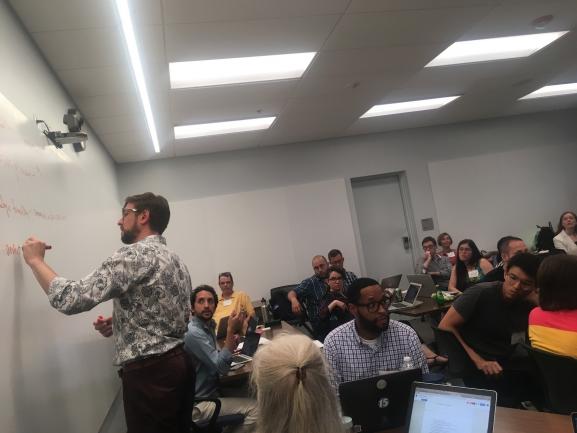
The program began with a robust introduction to the core questions in public humanities scholarship. We used these as our springboard for a wider discussion of how the humanities can address interdisciplinary challenges that confront society today. After developing a foundation in the theory and methods of public humanities scholarship, we conducted site visits that brought theory to practice in the world of foundations, public events planning, and employers. Day three was devoted to issues of employment for humanities practitioners, in the context of a Career Expo that offered opportunities for both interviewing and resume development.
The hallmark of humanities disciplines is the ability to absorb a body of complex knowledge and then put it into play to develop alternative imagined futures. Advanced humanities students become critical thinkers, skillful communicators, and apt interpreters of complex systems. The Graduate Certificate in Engaged & Public Humanities aimed to deepen understanding of these habits of mind, strengthening the ability to articulate and communicate humanities values and skills to potential employers.
Questions that the in-person seminars addressed
- What is the value of the humanities in creating a sustainable, interconnected future?
- What role can those with advanced training in the humanities play in solving challenges as varied as climate change, mass incarceration, mass migration, and economic inequality?
- Why is the concept of “public humanities” crucial to the proper functioning of a democracy?
- What habits of thought, methods, and practices do advanced humanities students have to offer the public sphere?
Sessions focused on the potential for putting the humanities to use in public-facing roles. We looked at how Washington, DC has become a center for humanities activities, playing host to a wealth of agencies, non-profits, libraries, and other entities that value humanities training in their employees. Site visits included the Library of Congress, the Folger Shakespeare Library, and a local think-tank, the Center of Concern.
The program culminated in a Career Expo for Humanities Scholars, which was preceded by panel discussions on careers beyond academia and mentoring sessions on developing appropriate skills. The Expo then sought to bring together humanities graduates throughout the DC area with employers in a variety of sectors interested in hiring humanities scholars. A non-credit certificate was awarded to all participants who complete all three days of the Institute.
A sample of the required readings
- Brooks, Peter. “The Humanities as an Export Commodity.” Profession 32.1 (2008): 33–39.
- Jay, Gregory. “The Engaged Humanities: Principles and Practices for Public Scholarship and Teaching.” Journal of Community Engagement and Scholarship 3.1 (2010): 51–63.
- Warner, Michael. “Publics and Counterpublics.” Public Culture 14.1 (2002): 49–90.
Career Expo for Humanities Scholars
Date: June 23, 2018
The Second Annual Career Expo for Humanities Scholars featured workshops and a career expo to open and free to all interested graduate students in the humanities.
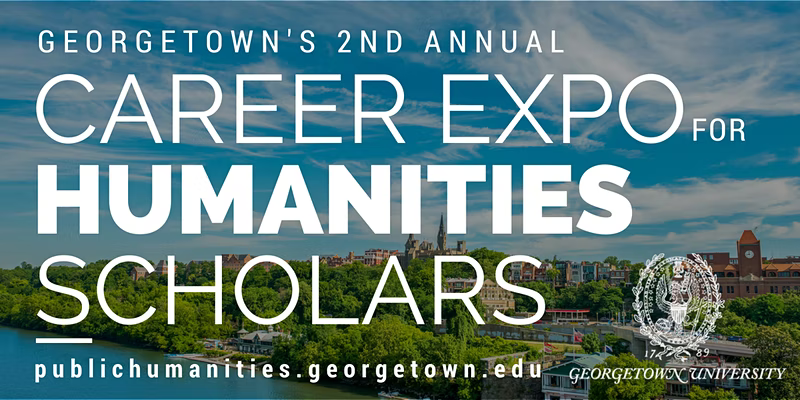
The morning workshops provided students with the opportunity to think about how they want to communicate their valuable training as humanists to potential employers. Led by the Connected Academics team, the workshops included sessions on interviewing, translating a CV into a resume, and honing one’s LinkedIn narrative.
The Expo brought together graduate students in the humanities and potential employers in the Greater Washington D.C. region, from think tanks and academic administration to nonprofit and private industry roles, currently or potentially looking for a writer, editor, translator, corporate trainer, higher education administrator, or researcher with an M.A. or Ph.D.
Attendees were encouraged to come to the Expo in order to discuss their own academic and professional narratives, ask representatives about their own post-academic journeys, and forge connections as they prepare for future hiring cycles.
The team that organized the event included:
- Kathryn Temple, former chair of the English Department at Georgetown University, and the Georgetown principal investigator on the Mellon-funded grant “Connected Academics: Preparing Doctoral Students of Language and Literature for a Variety of Careers.” She publishes on subjects related to Law & the Humanities and the History of Emotion. Her current book project, Loving Justice: Blackstone’s Commentaries, Legal Emotions, and Anglo–American Conceptions of Justice, was issued by NYU Press in Spring 2019.
- Justin Quam, then Ph.D. candidate in the Department of German at Georgetown University, who participated since 2016 in the Georgetown University, Modern Language Association (MLA) and Connected Academics’ ReinveintPhD project. His research focuses on the lessons that language teachers and curriculum developers can draw from research into narratives. His interest in language learning stems from the thirteen summers he spent teaching German at Concordia Language Villages, a language and culture immersion program in northern Minnesota. He received his M.A. in German from Georgetown University in 2016.
- Lauren Frey, then candidate for the M.A. in English in the Department of English at Georgetown University, who participated in the ReinventPhD project since 2017. Her research focuses on modernist poetry, women’s suffrage, and notions of the public sphere in early 20th-century American culture and literature.
This event was funded by Connected Academics, a Mellon Foundation-funded project of the Modern Language Association.
Coffee Break for MA and PhD Students in the Humanities
Date: May 2, 2018
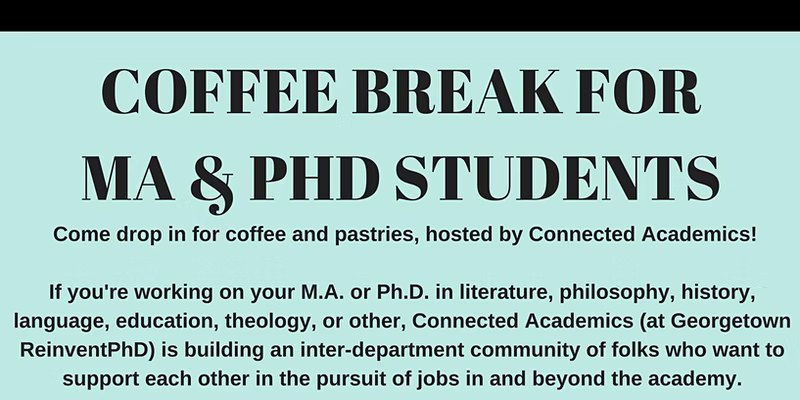
The Georgetown University, Modern Language Association (MLA) and Connected Academics’ ReinveintPhD project hosted this coffee break (providing participants with coffee and pastries), as part of its efforts in building an inter-department community of folks who want to support each other in the pursuit of jobs in and beyond the academy. Students working on an M.A. or Ph.D. in literature, philosophy, history, language, education, theology, or other humanities discipline were welcome to meet other grad students and catch a few shameless plugs for the then-upcoming Graduate Certificate in Engaged & Public Humanities.
Cases for Culture
Date: March 27, 2018
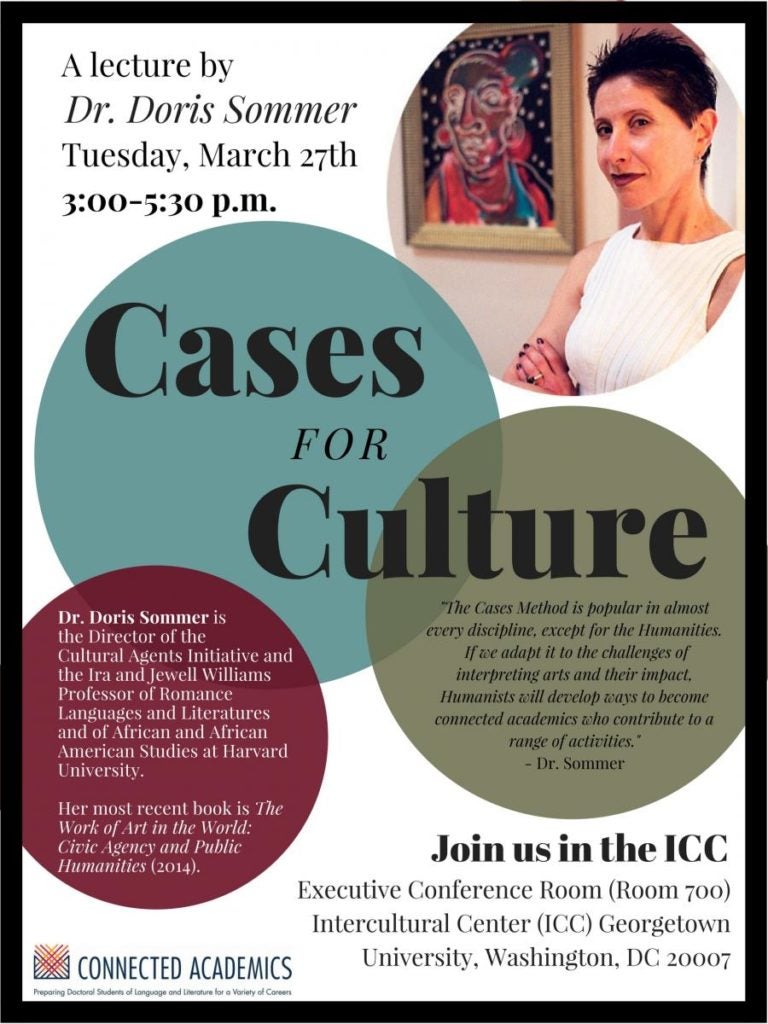
In this event, hosted by the Georgetown University, Modern Language Association (MLA) and Connected Academics’ ReinveintPhD project, Doris Sommer talks about the cases method to study the impact of the arts in society. In Sommer’s words, “the cases method is popular in almost every discipline, except for the Humanities. If we adopt it to the challenges of interpreting arts and their impact, Humanists will develop ways to become connected academics who contribute to a range of activities”.
Doris Sommer is the Director of the Cultural Agents Initiative and the Ira and Jewell Williams Professor of Romance Languages and Literatures and of African and African American Studies at Harvard University. Her most recent work is The Work of Art in the World: Civic Agency and Public Humanities (2014).
The Public Humanities and Beyond
Date: March 16, 2018
This event, hosted by the Georgetown University, Modern Language Association (MLA) and Connected Academics’ ReinveintPhD project, consisted of discussion on how to reinvent graduate education in the humanities.
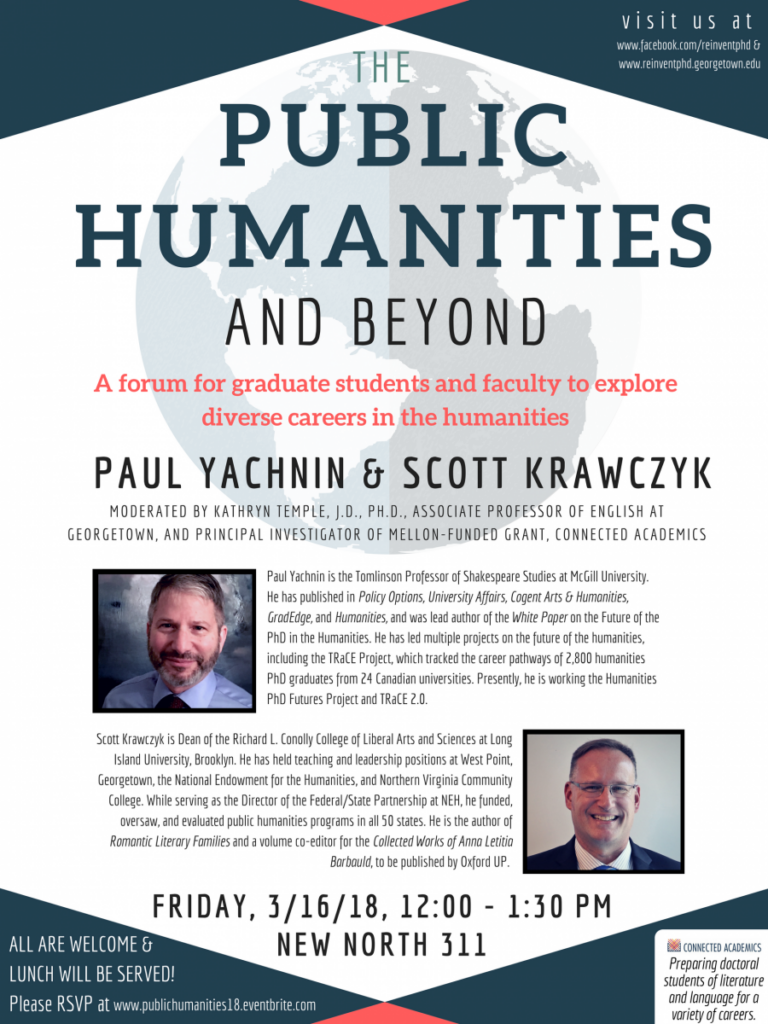
This panel brought together Paul Yachnin (McGill University) and Scott Krawczyk (Long Island University), who came with extensive knowledge on mentoring graduate students for diverse careers in the humanities. The discussion focused on the question of what academic institutions, faculty, and graduate students can do to foster a broader awareness of — and excitement for — career pathways outside of academia. The event also held a Q&A. The conversation also included Professor Kathryn Temple as moderator, and Beth Harlan as respondent.
This conversation was especially pertinent for graduate student interested in:
- rethinking the narrative of their master’s or doctoral journeys,
- practicing strategies for pursuing fulfilling careers in a variety of settings (from think tanks and academic administration to nonprofit and private industry roles),
- and translating skills and habits of thought central to a graduate education.
Scott Krawczyk is Dean of the Richard L. Conolly College of Liberal Arts and Sciences at Long Island University, Brooklyn. He has held teaching and leadership positions at West Point, Georgetown, the National Endowment for the Humanities, and Northern Virginia Community College. While serving as the Director of the Federal/State Partnership at NEH, he funded, oversaw, and evaluated public humanities programs in all 50 states. He is the author of Romantic Literary Families and a volume co-editor for the Collected Works of Anna Letitia Barbauld, to be published by Oxford UP.
Paul Yachnin is the Tomlinson Professor of Shakespeare Studies at McGill University. In addition to his publications on early modern literature and culture, he works on higher education practice and policy, focusing on the humanities PhD. He has published in Policy Options, University Affairs, Cogent Arts & Humanities, GradEdge, and Humanities, and was lead author of the White Paper on the Future of the PhD in the Humanities. He has led multiple successful projects in the future of humanities, including the TRaCE Project, which tracked the career pathways of 2,800 humanities PhD graduates from 24 Canadian universities. Presently, he is working on the Humanities PhD Futures Project and TRaCE 2.0.
Kathryn Temple, J.D., Ph.D., former chair of the English Department at Georgetown University, is the Georgetown principal investigator on the Mellon-funded grant, Connected Academics: Preparing Doctoral Students of Language and Literature for a Variety of Careers. She publishes on subjects related to Law & the Humanities and the History of Emotion. Her current book project, Loving Justice: Blackstone’s Commentaries, Legal Emotions, and Anglo-American Conceptions of Justice, will be issued by NYU Press in Spring 2019.
Beth Harlan is Associate Director for Career Education & Counseling at the Cawley Career Education Center. She came to Georgetown in August 2009 with experience in undergraduate student affairs and international programs. She earned a Master of Arts in Counseling from Wake Forest University and a Bachelor of Science degree in human and organizational development from Vanderbilt University. Beth is a Licensed Professional Counselor in the District of Columbia and is also certified by the National Board for Certified Counselors.
2017
Beyond Academia: Georgetown University’s Inaugural Career Fair for Humanities Scholars
Date: May 24, 2017
The Inaugural Career Fair for Scholars in the Humanities, co-hosted by Connected Academics and the Cawley Career Education Center, connected thirty current and recent graduate students in the humanities interested in employment beyond academia with a dozen employers in a variety of sectors interested in hiring humanities scholars.
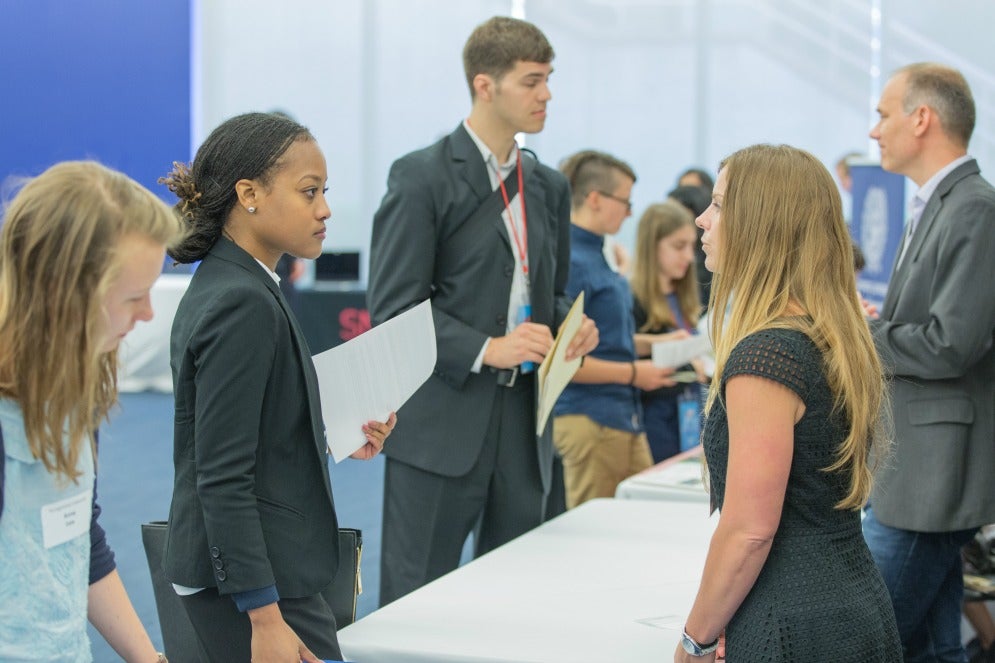
The fair began with a panel discussion on the rewards and challenges humanities graduates face in finding non-traditional academic employment. Steve Olsen of the Modern Languages Association and Beth Harlan of Georgetown’s Cawley Career Education Center discussed their experiences working with humanities graduate students as they prepared for non-academic job markets. Professor Ricardo Ortiz discussed the steps he and a team of Georgetown humanities professors have taken in developing a doctoral program in the public humanities. Dr. Maggie Debelius and Dr. Nick Moschovakis both shared their first- and second-hand experience and advice for humanities PhDs interested in transitioning into non-teaching non-research positions.
Following the panel discussion, current and recent humanities graduate students from Georgetown University and other academic institutions in the Washington, DC region attended a career fair where they had the opportunity to learn about a variety of DC-area employers. The humanities graduate students represented disciplines from across the humanities spectrum, including Philosophy, History, Theology, English, and Communications. Employers represented a range of industries and sectors, including the federal government, local government, private consulting firms, higher education, international non-profits and public service.
